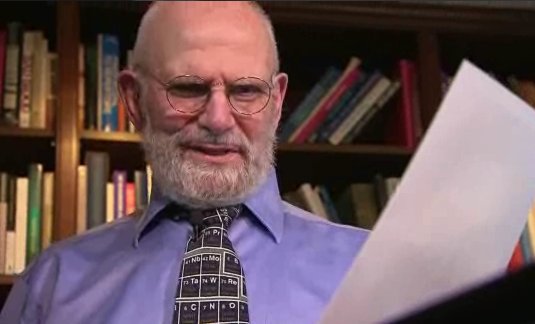Acclaimed author and neurologist Oliver Sacks, who wrote about his battle with cancer, died early Sunday, his longtime collaborator, Kate Edgar, confirmed. He was 82.
Edgar said Sacks died at his home in Greenwich Village with her and his partner, Bill Hayes, at his side.
Sacks was diagnosed with ocular melanoma nine years ago, and treating the cancer left him blind in one eye, he wrote in an op-ed for The New York Times.
But the cancer spread.
“I feel grateful that I have been granted nine years of good health and productivity since the original diagnosis, but now I am face to face with dying,” Sacks wrote in February. “The cancer occupies a third of my liver, and though its advance may be slowed, this particular sort of cancer cannot be halted.”
The British-born Sacks, who was on the staff of the New York University School of Medicine, is perhaps best known as the inspiration for the doctor portrayed by the late actor Robin Williams in the 1990 film “Awakenings.”
The film is based on Sacks’ 1973 book of the same name, recounting his experiences treating patients who have long been in a catatonic state after contracting “sleeping sickness.”
In his long career, he made a practice of marrying clinical practice with narrative storytelling.
“If we wish to know about a man, we ask ‘what is his story — his real, inmost story?’ — for each of us is a biography, a story,” he wrote in his 1985 book, “The Man Who Mistook His Wife for a Hat.”
“Each of us is a singular narrative, which is constructed, continually, unconsciously, by, through, and in us — through our perceptions, our feelings, our thoughts, our actions; and, not least, our discourse, our spoken narrations,” he said. “Biologically, physiologically, we are not so different from each other; historically, as narratives — we are each of us unique.”
The habit that endeared him to many also brought criticism from some who accused him of being exploitative. Disability advocate Tom Shakespeare once called him “the man who mistook his patients for a literary career.”
But news of Sacks’ death was met with widespread praise of his life, with fans from all walks of life hailing him and his work as well as sharing many of his memorable quotes.
Edgar said arrangements are still being made for a service for Sacks. Those wishing to honor him are asked to make donations to The Oliver Sacks Foundation which, according to the website, is “devoted to increasing understanding of the human brain and mind through the power of narrative nonfiction and case histories.”
